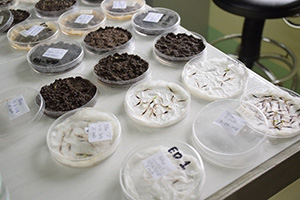 Caraga, the “timber corridor of the country,” will soon have supply of improved and fortified forest tree seeds through the Mindanao Tree Seed Center (MTSC).
Caraga, the “timber corridor of the country,” will soon have supply of improved and fortified forest tree seeds through the Mindanao Tree Seed Center (MTSC).
The Mindanao Tree Seed Center (MTSC), one of the major sources of seeds and planting materials of the country’s National Greening Program (NGP), will soon have supply of improved and fortified forest tree seeds.
MTSC’s improved and fortified seeds will be developed through the project, “Forest Tree Seed Quality Enhancement and Development of MTSC – Seed Tracking and Information Database System,” which was recently approved by the Philippine Council for Agriculture, Aquatic and Natural Resources Research and Development under the Department of Science and Technology (DOST-PCAARRD).
Aside from developing seeds, the project aims to develop protocols on the improvement of quality seeds produced by MTSC for specific areas – mined-out areas, reforestation areas, and tree plantations – through different seed quality enhancement treatments. It also aims to develop and adopt a seed tracking and information database system.
Through the project, MTSC will regularly monitor and assess the stored seeds.
MTSC has more than 36 indigenous species of trees and is a repository of genetically superior seeds of major tree-plantation species like falcata, mangium, bagras, yemane, and other fast-growing tree species that are popularly used by tree farmers. It also has in list a total of 590 plus trees and 215 other tree species that were documented as candidate plus trees for germplasm collection.
Based in Maharlika, Bislig City, Surigao del Sur, the MTSC was established in March 2014 and directly managed by the Department of Environment and Natural Resources (DENR)-Ecosystems Research and Development Bureau (ERDB). This center directly caters to the seeds and seedlings requirements of eastern Caraga and southern, western, and autonomous regions of the country.
One of the facility’s missions is to address the continuous supply of quality planting material need of the forest production and protection objectives of the government. It aims to ensure improved survival and increased plantation yield of trees in Caraga, being the major source of plantation timber in the country, thus dubbed as the “plantation wood corridor of the country.”
This study will run for three years, until 2023, with the hope to explore the natural potential of seed quality enhancement through series of laboratory and field research trials.
